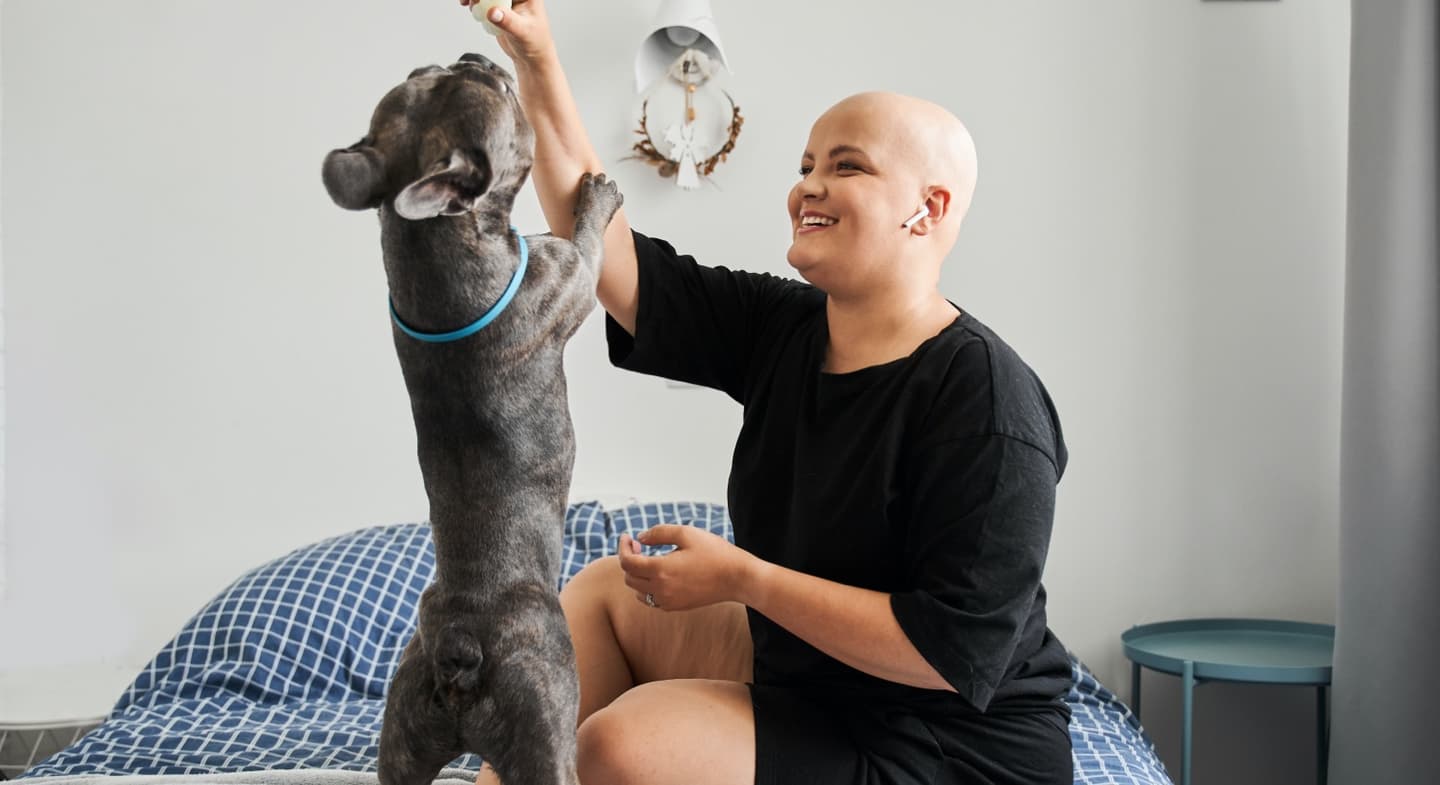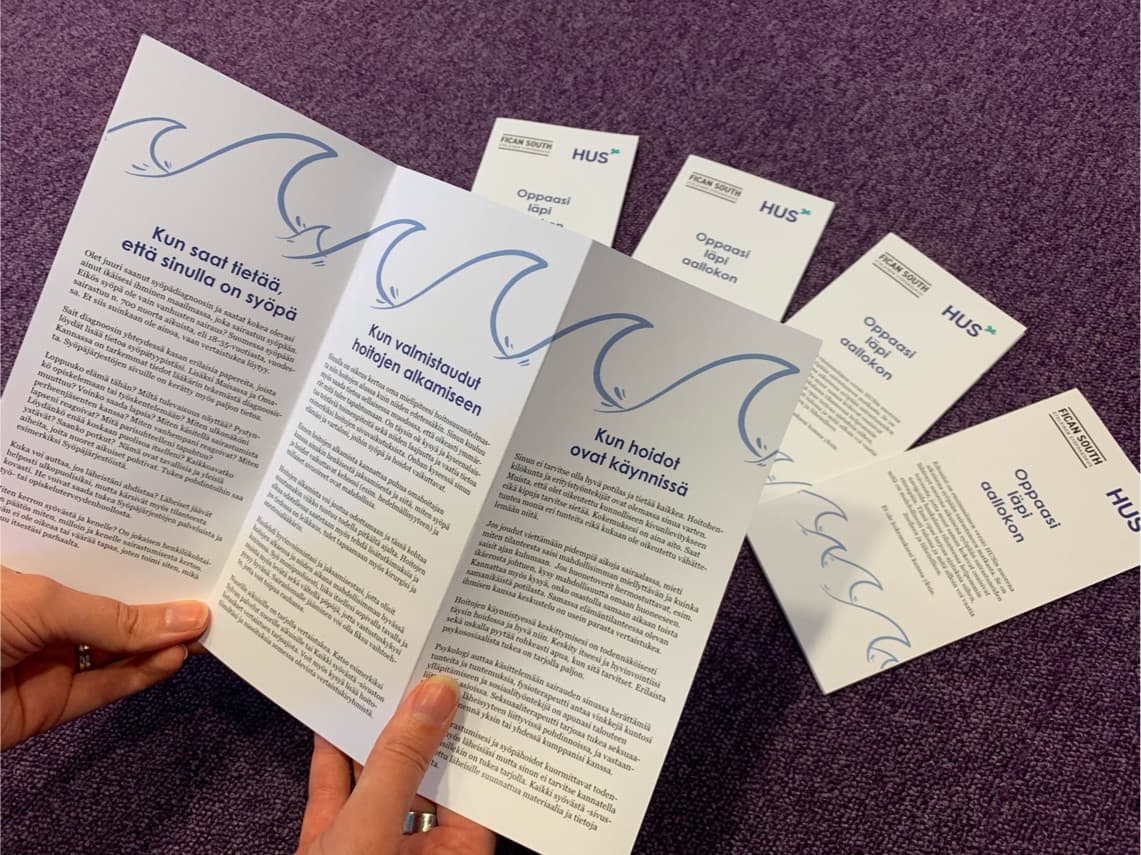FICAN South: Improving the cancer patient journey for the young
FICAN South coordinates cancer diagnostics and care and promotes cancer research in Southern Finland. As a patient-centric and proactive development unit, it wanted to better understand the needs of adolescents and young adults diagnosed with cancer and meet them equitably. We designed a comprehensive journey from the patient’s perspective and a practical guide to help and support after diagnosis.

The challenge
Adolescents and young adults (AYA) aged 15–39 diagnosed with cancer are an often insufficiently understood patient group requiring special care. They are a diverse group of people with different backgrounds and varying levels of resilience for facing the crisis the diagnosis presents. A cancer diagnosis also affects the patient’s family and loved ones in many ways – especially when the patient is young. How to get help and the services that are available are not always clear, so identifying their needs and forming a comprehensive view on what happens after the diagnosis was important.

Outcomes and impact
Supporting cancer patients: improved help for surviving the crisis and rebuilding life
Patient perspective on journeys: development based on real needs
Comprehensive overview and ideas: clarifying future development opportunities
What we did
To understand and meet the patients’ needs, you need to start looking at things from their perspective. Thus, both the patients and healthcare professionals need to participate in the process. This is especially important when designing healthcare services. To ensure FICAN South can focus on the right things in their service development, maximize the effectiveness and minimize the associated risks, we designed the journey using service design methodology.
Futurice made the invisible visible. The process was smooth, professional, and precise from the beginning. They truly care about what they do. We now have practical insight and tools to improve cancer patients’ lives. We also learned new, better ways of working. Futurice made a lasting positive impact.
Why it matters
We started by examining a wide variety of background materials related to the field, followed by the first workshop with the patients themselves. Our aim was to understand their post-diagnosis journeys – what happens when and after they meet the doctor, as well as when they encounter families and friends. The patients’ experiences varied widely. For example, questions related to sexuality, body image and fertility were sensitive among single patients. It was clear that the patients’ journeys are equal only if their individual perspectives along the way are considered.
The second and third workshops were held with healthcare professionals: doctors, nurses, and therapists. We wanted to have as many areas of knowledge as possible represented. Many important issues were highlighted, among them how well the therapeutics knew the reasons an individual patient comes to their appointment and were the patients aware of the services they are eligible for. We also reviewed the findings of the first workshop, sparking discussions on many important issues, such as the variety of patient experiences; how seriously they were taken and directed for further examinations; and how to confront their fear of death and rebuild their lives after recovery. The fourth workshop was held with representatives of patient support NGOs.
Using the extensive body of information gathered, we designed service paths that were validated with FICAN South’s AYA patient advisory board. The journey map for internal use describes the patient’s detailed journey and what services are or are not part of it. We also created a practical guide that encourages and advises patients, reminding them that they are not alone on their journey.
Finally, we provided FICAN South with a detailed report on the insights, ideas for further development, and delivered the raw data to support planning and decision making. The entire process was successfully facilitated remotely.
Results
The service paths and tangible suggestions help FICAN South focus, communicate, and prioritize future development projects based on the real needs of patients. The solutions for the identified challenges, such as training and educating professionals of different areas in healthcare are already being implemented. The process has brought the stakeholders together to work towards the common goal of developing the support provided for patients after cancer treatments. The new know-how is also shared with other FICAN organizations around Finland. Most importantly, the cancer patients now get more equal and effective help for surviving the difficult journey and rebuilding their lives.
Team
Client: FICAN South
Design: Futurice
About Fican South
The Southern Finland National Cancer Center, FICAN South, coordinates cancer diagnostics and care, and promotes cancer research in Southern Finland as a part of the national FICAN organization. The development unit supports the care recommendation work and helps to guarantee first class cancer diagnostics and treatment, as well as promote transnational research for the patients best. FICAN South is comprised of HUS Helsinki University Hospital, Päijät-Häme Joint Authority for Health and Wellbeing (PHHYKY), Joint Authority for Kymenlaakso Social and Health Care Services (Kymsote), South Karelia Social and Health Care District (Eksote), and the University of Helsinki, which is in charge of medical research and education.
Get in touch
Looking for help with an idea, brand new brief or in-flight project? Drop us a line for a straightforward conversation.